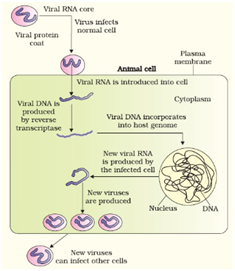The given diagram shows the formation of:

1. Conidia on sporangiophores
2. Ascospores on asci
3. Basidiospores on a basidium
4. Conidia on conidiophores

2. Ascospores on asci
3. Basidiospores on a basidium
4. Conidia on conidiophores
Which of the following will be the virus for which the typical life cycle would be as shown in the given figure?

1. Reovirus
2. Rotavirus
3. Arbovirus
4. Retrovirus
Identify the incorrect statement regarding the novel corona virus [2019-nCoV]:
1. It is a double-stranded RNA coronavirus
2. The virus is thought to have a zoonotic origin
3. Human-to-human transmission of the virus has been confirmed
4. Mode of transmission is through respiratory droplets from coughs and sneezes
The fruiting body of a fungus contains many structures with eight haploid spores lined up in a row. This fungus belongs to the class:
| 1. | phycomycete | 2. | ascomycete |
| 3. | deuteromycete | 4. | basidiomycete |
In an individual basidiomycete fungus, the size of the following [largest to smallest] will be:
| a. | basidiocarp | b. | basidium |
| c. | basidiospore | d. | mycelium |
| e. | gill |
| 1. | d, e, a, b, c | 2. | e, a, d, b, c |
| 3. | e, a, d, c, b | 4. | d, a, e, b, c |
An earlier treatment of pituitary dwarves with the pituitary extracts of cadavers was frequently fatal as the recipients developed:
1. CJD
2. Scrapie
3. BSE
4. Kuru
In a fungus like Neurospora, conidia can be distinguished from ascospores as:
| 1. | ascospores are diploid, conidia are haploid |
| 2. | ascospores are produced only by meiosis, conidia are produced only by mitosis |
| 3. | ascospores have undergone genetic recombination during their production, conidia have not |
| 4. | ascospores are larger, conidia are smaller |
Identify the correct statement regarding prions:
I. They are misfolded proteins with the ability to transmit their misfolded shape onto normal variants of the same protein
II. They act very fast with a very short incubation period
III. They are virtually indestructible
1. Only I and II
2. Only I and III
3. Only II and III
4. I, II and III
Which of the following will not be true for archaebacteria?
1. Methanobacteriales do have cell walls containing pseudopeptidoglycan
2. Branched chained lipids in cell membrane may help prevent archaeal membranes from leaking at high temperatures
3. Although archaea only have one type of RNA polymerase, its structure and function in transcription seems to be close to that of the eukaryotic RNA polymerase II
4. Like true bacteria the genes in archaea also lack any introns
A bacterium, Ideonella sakaiensis, discovered recently, is capable of:
1. breaking down and consuming the plastic
2. clearing oil spoils in cold waters
3. producing cynocobalamin during fermentation
4. fixing atmospheric nitrogen in cereals






